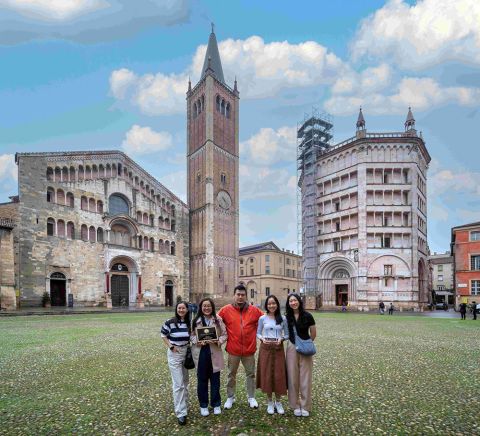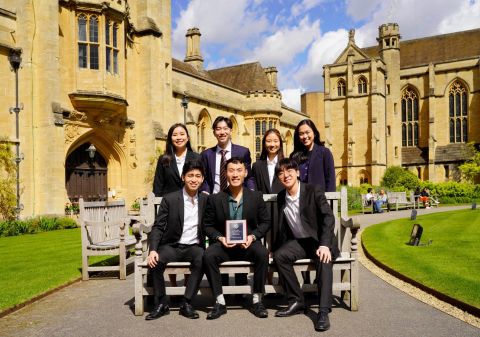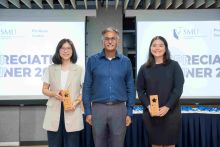Training SMU mooters to achieve success at world championships and contribute positively to society
Mooting – a mock courtroom experience – is crucial in helping to hone the skills of law students. It provides students with an opportunity to apply the knowledge they’ve gained in the classroom in a simulated legal environment, bridging the gap between academic learning and legal practice.
SMU’s law students have seen considerable success at international moots, despite its first batch of law students graduating only in 2011. SMU’s international mooters have regularly placed in the top three of the Grand Slam moots – the largest and most prestigious of such competitions in the world. In fact, SMU teams have clinched an impressive 62 championship wins both regionally and internationally, alongside 46 first-runner-up and 57 second-runner-up awards – a remarkable showing for a young university.
A key factor driving this success is the Ian R Taylor International Moots Programme, which has firmly established the SMU Yong Pung How School of Law (YPHSL) on the global stage. This programme has nurtured generations of mooters who have earned numerous world-class accolades, enabling SMU to consistently excel at the most prestigious international moots.
A record of excellence
YPHSL is ranked among the top three law schools worldwide for international moots, according to the Nica.team Law School Ranking. The school is also the tournament leader in prominent competitions such as the International Criminal Court (Hague), Price Media Law (Oxford), Frankfurt Investment, and Vis East (Vienna) moots. SMU teams have consistently excelled in the Jessup (Washington) and LAWASIA competitions, among many others.
This year alone has been another stellar one for SMU, as its mooters claimed world championship titles in the ICC, Refugee Migration, and Fletcher competitions. Additionally, SMU teams reached the world championship finals in the Price, Stetson, and Mandela competitions, while also achieving their maiden win in the Lachs Space moot.


A strategic edge for dispute resolution
The consistent achievements of SMU’s mooters not only reflect the high calibre of its students and training but also align with Singapore’s ambition to become a leading global hub for dispute resolution. The Ian R Taylor International Moots Programme and the unwavering dedication of YPHSL faculty, such as Associate Professor Chen Siyuan, Director of Moots, have played pivotal roles in fostering this excellence.
As SMU continues to soar in the international mooting arena, it underscores the School’s commitment to bridging academic learning with practical legal skills, equipping students to excel both in competitions and in their future careers.
The support of a solid mooting community
SMU students are able to participate in around 30 international moot competitions every year thanks to generous funding for the Ian R Taylor Moot Programme, as well as support from Providence Law Asia LLC, the International Moots Alumni Fund, and mentorship from a community of more than 500 moot alumni coaches and judges.
This same community is a big part of how SMU helps its students achieve success in mooting.
“In the international moots programme, no student moots alone. Each student is surrounded by teammates, coaches, alumni judges, faculty, admin staff, and members of the fraternity,” says Assoc Prof Chen.
“Community builds trust and friendships, and when people feel that they are all united by a common goal, where everyone is pushing themselves to achieve excellence, you create a culture that is positive, self-perpetuating and forward-looking.”
While students might assume that mooting is only for those with good grades and have public-speaking experience, SMU has established a proven system with alumni mentorship and data management that strikes a good balance between guiding students to success, as well as teaching them to thrive independently.
In fact, Assoc Prof Chen assures students that the SMU mooting community can and is extremely willing to train any student who wants to give mooting a shot, as long as they have the right mindset. What’s more, the generosity of the Ian R Taylor Memorial Fund, Providence Law Asia LLC and the International Moots Alumni Group also ensures that there are no financial barriers to entry for students who want to sign up for international moots.
The lessons learnt from mooting
While SMU provides invaluable support that enables students to achieve success in mooting, students themselves must of course put in the effort to reap the benefits.
According to Assoc Prof Chen, one of the biggest ways in which mooting helps students develop their legal skills and knowledge are how the moots train students to size up a complex legal problem quickly while under great pressure.
Two other ways in which mooting helps students develop are less rooted in legal know-how: building resilience in the face of failure and honing their communication skills.
Regarding what students should be prepared for, Assoc Prof Chen highlights patience and being prepared to put in the work as the two most important traits.
“It will take a while to get the basics right, so one must consciously avoid being discouraged too easily by criticism or roadblocks in research,” he says.
“Mooters who make mooting look easy have spent months, if not years, finetuning their craft. And even then, in the grander scheme of things, they are just rookies in law because they have not even entered working life.”
As for “putting in the work required”, Assoc Prof Chen asserts that this investment pays off by giving you time to practise the skills which many legal organisations expect graduates to already have honed even as they embark on their next big chapter in working life.
On what is the greatest takeaway, Assoc Prof Chen’s advice is simple: “Much as we strive for excellence in SMU, winning is not the end goal. Instead, it is about taking the training seriously with the understanding that as lawyers-to-be, they hold an important role in society with serious consequences if they do not discharge their obligations properly.
“At the same time, I think many of my mooters would agree that despite all the hard work, moots are ultimately great fun!”

